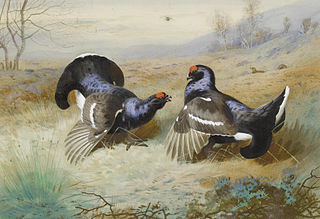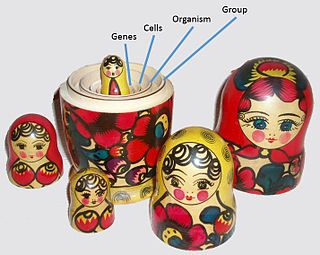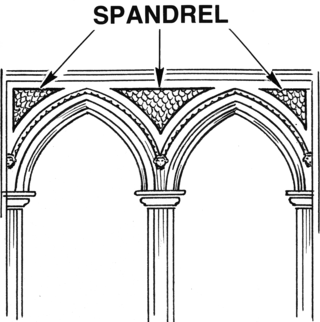
Evolutionary psychology is a theoretical approach in psychology that examines cognition and behavior from a modern evolutionary perspective. It seeks to identify human psychological adaptations with regards to the ancestral problems they evolved to solve. In this framework, psychological traits and mechanisms are either functional products of natural and sexual selection or non-adaptive by-products of other adaptive traits.
The noosphere is a philosophical concept developed and popularized by the Russian-Ukrainian Soviet biogeochemist Vladimir Vernadsky, and the French philosopher and Jesuit priest Pierre Teilhard de Chardin. Vernadsky defined the noosphere as the new state of the biosphere and described as the planetary "sphere of reason". The noosphere represents the highest stage of biospheric development, that of humankind's rational activities.

Sociobiology is a field of biology that aims to examine and explain social behavior in terms of evolution. It draws from disciplines including psychology, ethology, anthropology, evolution, zoology, archaeology, and population genetics. Within the study of human societies, sociobiology is closely allied to evolutionary anthropology, human behavioral ecology, evolutionary psychology, and sociology.

The Selfish Gene is a 1976 book on evolution by the ethologist Richard Dawkins, in which the author builds upon the principal theory of George C. Williams's Adaptation and Natural Selection (1966). Dawkins uses the term "selfish gene" as a way of expressing the gene-centred view of evolution, popularising ideas developed during the 1960s by W. D. Hamilton and others. From the gene-centred view, it follows that the more two individuals are genetically related, the more sense it makes for them to behave cooperatively with each other.

Group selection is a proposed mechanism of evolution in which natural selection acts at the level of the group, instead of at the level of the individual or gene.
In the philosophy of mind, the user illusion is a metaphor for a proposed description of consciousness that argues that conscious experience does not expose objective reality, but instead provides a simplified version of reality that allows humans to make decisions and act in their environment, akin to a computer desktop. According to this picture, our experience of the world is not immediate, as all sensation requires processing time. It follows that our conscious experience is less a perfect reflection of what is occurring, and more a simulation produced unconsciously by the brain. Therefore, there may be phenomena that exist beyond our peripheries, beyond what consciousness could create to isolate or reduce them.

A unit of selection is a biological entity within the hierarchy of biological organization that is subject to natural selection. There is debate among evolutionary biologists about the extent to which evolution has been shaped by selective pressures acting at these different levels.
Sociocultural evolution, sociocultural evolutionism or social evolution are theories of sociobiology and cultural evolution that describe how societies and culture change over time. Whereas sociocultural development traces processes that tend to increase the complexity of a society or culture, sociocultural evolution also considers process that can lead to decreases in complexity (degeneration) or that can produce variation or proliferation without any seemingly significant changes in complexity (cladogenesis). Sociocultural evolution is "the process by which structural reorganization is affected through time, eventually producing a form or structure that is qualitatively different from the ancestral form".
The evolution of human intelligence is closely tied to the evolution of the human brain and to the origin of language. The timeline of human evolution spans approximately seven million years, from the separation of the genus Pan until the emergence of behavioral modernity by 50,000 years ago. The first three million years of this timeline concern Sahelanthropus, the following two million concern Australopithecus and the final two million span the history of the genus Homo in the Paleolithic era.
The history of life on Earth seems to show a clear trend; for example, it seems intuitive that there is a trend towards increasing complexity in living organisms. More recently evolved organisms, such as mammals, appear to be much more complex than organisms, such as bacteria, which have existed for a much longer period of time. However, there are theoretical and empirical problems with this claim. From a theoretical perspective, it appears that there is no reason to expect evolution to result in any largest-scale trends, although small-scale trends, limited in time and space, are expected. From an empirical perspective, it is difficult to measure complexity and, when it has been measured, the evidence does not support a largest-scale trend.

In evolutionary biology, a spandrel is a phenotypic trait that is a byproduct of the evolution of some other characteristic, rather than a direct product of adaptive selection. Stephen Jay Gould and Richard Lewontin brought the term into biology in their 1979 paper "The Spandrels of San Marco and the Panglossian Paradigm: A Critique of the Adaptationist Programme". Adaptationism is a point of view that sees most organismal traits as adaptive products of natural selection. Gould and Lewontin sought to temper what they saw as adaptationist bias by promoting a more structuralist view of evolution.

The global brain is a neuroscience-inspired and futurological vision of the planetary information and communications technology network that interconnects all humans and their technological artifacts. As this network stores ever more information, takes over ever more functions of coordination and communication from traditional organizations, and becomes increasingly intelligent, it increasingly plays the role of a brain for the planet Earth.
The concept of the evolution of morality refers to the emergence of human moral behavior over the course of human evolution. Morality can be defined as a system of ideas about right and wrong conduct. In everyday life, morality is typically associated with human behavior rather than animal behavior. The emerging fields of evolutionary biology, and in particular evolutionary psychology, have argued that, despite the complexity of human social behaviors, the precursors of human morality can be traced to the behaviors of many other social animals. Sociobiological explanations of human behavior remain controversial. Social scientists have traditionally viewed morality as a construct, and thus as culturally relative, although others such as Sam Harris argue that there is an objective science of morality.
The evolutionary psychology of religion is the study of religious belief using evolutionary psychology principles. It is one approach to the psychology of religion. As with all other organs and organ functions, the brain's functional structure is argued to have a genetic basis, and is therefore subject to the effects of natural selection and evolution. Evolutionary psychologists seek to understand cognitive processes, religion in this case, by understanding the survival and reproductive functions they might serve.

Dawkins vs. Gould: Survival of the Fittest is a book about the differing views of biologists Richard Dawkins and Stephen Jay Gould by philosopher of biology Kim Sterelny. When first published in 2001 it became an international best-seller. A new edition was published in 2007 to include Gould's The Structure of Evolutionary Theory finished shortly before his death in 2002, and more recent works by Dawkins. The synopsis below is from the 2007 publication.

The evolutionary origin of religion and religious behavior is a field of study related to evolutionary psychology, the origin of language and mythology, and cross-cultural comparison of the anthropology of religion. Some subjects of interest include Neolithic religion, evidence for spirituality or cultic behavior in the Upper Paleolithic, and similarities in great ape behavior.
Conscious evolution refers to the theoretical ability of human beings to be conscious participants in the evolution of their cultures, or even of the entirety of human society, based on a relatively recent combination of factors, including increasing awareness of cultural and social patterns, reaction against perceived problems with existing patterns, injustices, inequities, and other factors. The realization that cultural and social evolution can be guided through conscious decisions has been in increasing evidence since approximately the mid-19th century, when the rate of change globally began to increase dramatically. The Industrial Revolution, reactions against the effects of the Industrial Revolution, the emergence of new sciences such as psychology, anthropology, and sociology, the revolution in global communication, the interaction of diverse cultures through transportation and colonization, anti-slavery and suffrage movements, and increasing lifespan all would contribute to the growing awareness of social and cultural patterns as being potentially subject to conscious evolution.
Evolutionary psychology of language is the study of the evolutionary history of language as a psychological faculty within the discipline of evolutionary psychology. It makes the assumption that language is the result of a Darwinian adaptation.

The following outline is provided as an overview of and topical guide to evolution:
Inclusive fitness in humans is the application of inclusive fitness theory to human social behaviour, relationships and cooperation.










